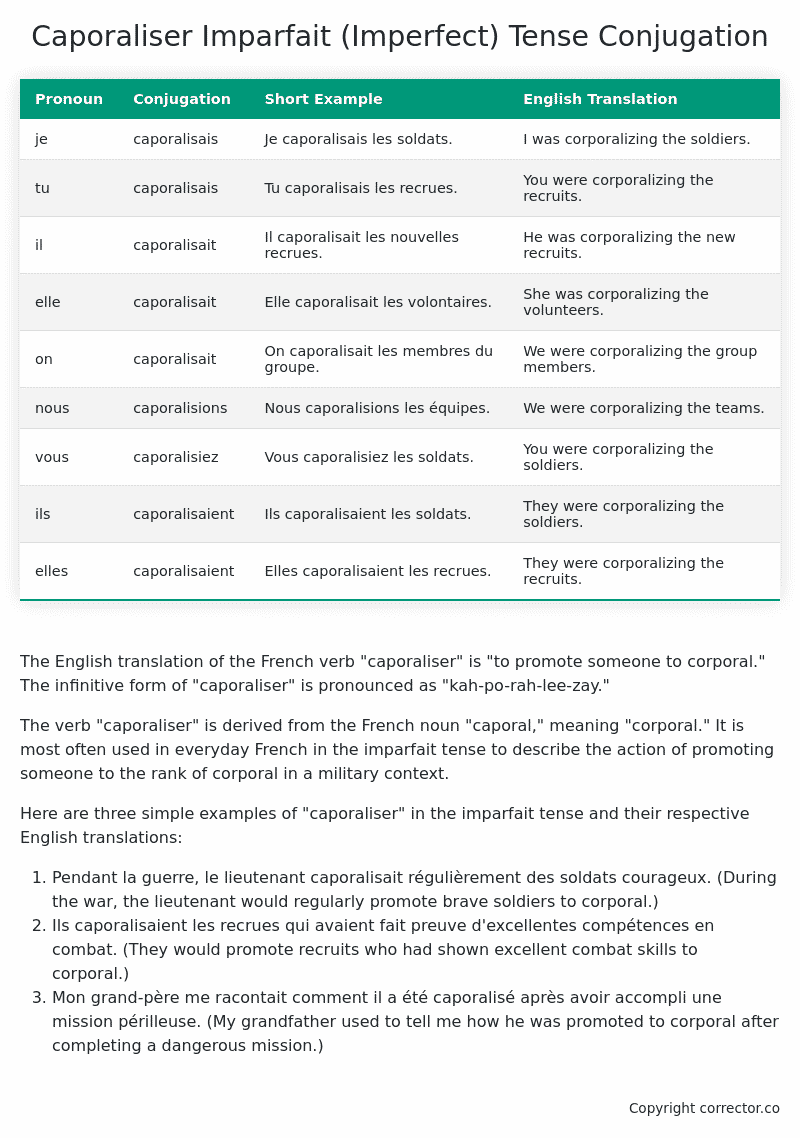Imparfait (Imperfect) Tense Conjugation of the French Verb caporaliser
Introduction to the verb caporaliser
The English translation of the French verb “caporaliser” is “to promote someone to corporal.” The infinitive form of “caporaliser” is pronounced as “kah-po-rah-lee-zay.”
The verb “caporaliser” is derived from the French noun “caporal,” meaning “corporal.” It is most often used in everyday French in the imparfait tense to describe the action of promoting someone to the rank of corporal in a military context.
Here are three simple examples of “caporaliser” in the imparfait tense and their respective English translations:
- Pendant la guerre, le lieutenant caporalisait régulièrement des soldats courageux. (During the war, the lieutenant would regularly promote brave soldiers to corporal.)
- Ils caporalisaient les recrues qui avaient fait preuve d’excellentes compétences en combat. (They would promote recruits who had shown excellent combat skills to corporal.)
- Mon grand-père me racontait comment il a été caporalisé après avoir accompli une mission périlleuse. (My grandfather used to tell me how he was promoted to corporal after completing a dangerous mission.)
Table of the Imparfait (Imperfect) Tense Conjugation of caporaliser
| Pronoun | Conjugation | Short Example | English Translation |
|---|---|---|---|
| je | caporalisais | Je caporalisais les soldats. | I was corporalizing the soldiers. |
| tu | caporalisais | Tu caporalisais les recrues. | You were corporalizing the recruits. |
| il | caporalisait | Il caporalisait les nouvelles recrues. | He was corporalizing the new recruits. |
| elle | caporalisait | Elle caporalisait les volontaires. | She was corporalizing the volunteers. |
| on | caporalisait | On caporalisait les membres du groupe. | We were corporalizing the group members. |
| nous | caporalisions | Nous caporalisions les équipes. | We were corporalizing the teams. |
| vous | caporalisiez | Vous caporalisiez les soldats. | You were corporalizing the soldiers. |
| ils | caporalisaient | Ils caporalisaient les soldats. | They were corporalizing the soldiers. |
| elles | caporalisaient | Elles caporalisaient les recrues. | They were corporalizing the recruits. |
Other Conjugations for Caporaliser.
Le Present (Present Tense) Conjugation of the French Verb caporaliser
Imparfait (Imperfect) Tense Conjugation of the French Verb caporaliser (You’re reading it right now!)
Passé Simple (Simple Past) Tense Conjugation of the French Verb caporaliser
Passé Composé (Present Perfect) Tense Conjugation of the French Verb caporaliser
Futur Simple (Simple Future) Tense Conjugation of the French Verb caporaliser
Futur Proche (Near Future) Tense Conjugation of the French Verb caporaliser
Plus-que-parfait (Pluperfect) Tense Conjugation of the French Verb caporaliser
Passé Antérieur (Past Anterior) Tense Conjugation of the French Verb caporaliser
Futur Antérieur (Future Anterior) Tense Conjugation of the French Verb caporaliser
Subjonctif Présent (Subjunctive Present) Tense Conjugation of the French Verb caporaliser
Subjonctif Passé (Subjunctive Past) Tense Conjugation of the French Verb caporaliser
Subjonctif Imparfait (Subjunctive Imperfect) Tense Conjugation of the French Verb caporaliser
Conditionnel Présent (Conditional Present) Tense Conjugation of the French Verb caporaliser
Conditionnel Passé (Conditional Past) Tense Conjugation of the French Verb caporaliser
Conditionnel Passé II (Conditional Past II) Tense Conjugation of the French Verb caporaliser
L’impératif Présent (Imperative Present) Tense Conjugation of the French Verb caporaliser
L’impératif Passé (Imperative Past) Tense Conjugation of the French Verb caporaliser
L’infinitif Présent (Infinitive Present) Tense Conjugation of the French Verb caporaliser
L’infinitif Passé (Infinitive Past) Tense Conjugation of the French Verb caporaliser
Le Participe Présent (Present Participle) Tense Conjugation of the French Verb caporaliser
Le Participe Passé (Past Participle) Tense Conjugation of the French Verb caporaliser
Struggling with French verbs or the language in general? Why not use our free French Grammar Checker – no registration required!
Get a FREE Download Study Sheet of this Conjugation 🔥
Simply right click the image below, click “save image” and get your free reference for the caporaliser imparfait tense conjugation!

Caporaliser – About the French Imparfait Tense
NOTE: To take a deep dive into all the French tenses then see our article on Mastering French Tense Conjugation.
Formation of the Imparfait Tense
For regular -er verbs:
For regular -ir verbs
For regular -re verbs
Common Everyday Usage Patterns
Description of Past Habits
Background Information
Mental and Emotional States
It’s employed to express emotions, thoughts, or physical sensations in the past. For example: “J’étais content quand il est arrivé.” (I was happy when he arrived.)
Ongoing Actions
Points to Note About the Imparfait Tense
Passé Composé vs. Imparfait
Conditional
Si Clauses
Narration
I hope you enjoyed this article on the verb caporaliser. Still in a learning mood? Check out another TOTALLY random French verb imparfait conjugation!


